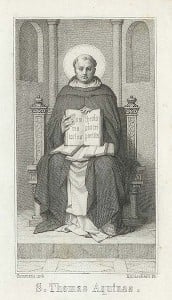 We’re blogging through St. Thomas Aquinas’ Compendium Theologiae, sometimes called his Shorter Summa. Find the previous posts here.
We’re blogging through St. Thomas Aquinas’ Compendium Theologiae, sometimes called his Shorter Summa. Find the previous posts here.
Today’s post is from Chapter 58, “Properties of the Son and the Holy Spirit”.
Having looked at the properties that distinguish the Father from the Son and the Holy Spirit, Thomas now looks at the properties that distinguish the Son and the Holy Spirit from the Father and from each other. It's very much more of what we saw last week, just looked at the other way around. It stems from the fact that the relationships between the Persons aren't symmetric, just as my relationships with my children aren't symmetric. I have the property of being their father; they have the property of being my children.
Two properties must pertain to the Son: one whereby He is distinguished from the Father, and this is filiation; another whereby, along with the Father, He is distinguished from the Holy Spirit; and this is their common spiration.
"Filiation" has the same root as "filial", as in "filial piety"; it might also be translated as "sonship". And "spiration", as I noted last week, comes from the same root as "spirit" and "inspire".
You can feel free to skim the following passage.
But no property is to be assigned whereby the Son is distinguished from the Holy Spirit alone, because as we said above, the Son and the Father are a single principle of the Holy Spirit. Similarly, no single property is to be assigned whereby the Holy Spirit and the Son together are distinguished from the Father. For the Father is distinguished from them by one property, namely, innascibility, inasmuch as He does not proceed. However, since the Son and the Holy Spirit proceed, not by one procession, but by several, they are distinguished from the Father by two properties. The Holy Spirit has only one property by which He is distinguished from the Father and the Son, and this is called procession. That there cannot be any property by which the Holy Spirit may be distinguished from the Son alone or from the Father alone, is evident from this whole discussion.
Accordingly five properties in all are attributed to the divine persons: innascibility, paternity, filiation, spiration, and procession.
Don't worry if some of these words convey little to your mind (other than paternity and filiation, which are analogous to human relationships). In Aristotelian metaphyics, relations between things are associated with properties of those things; and so Thomas is simply making sure that his readers have a technical vocabulary that won't get them into trouble if they speak of the relations between the Divine Persons in terms of properties of the Persons.
____
photo credit: Public Domain; source Wikimedia Commons








